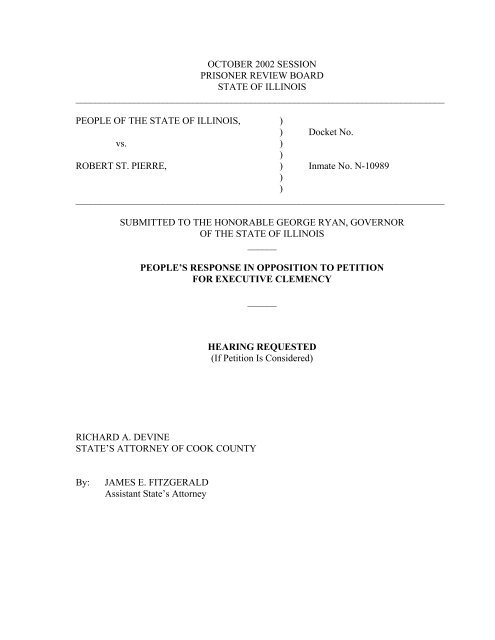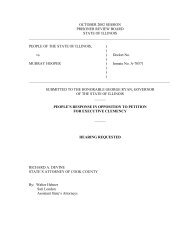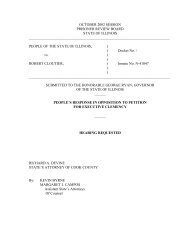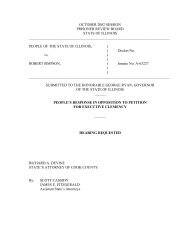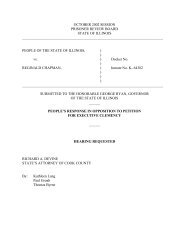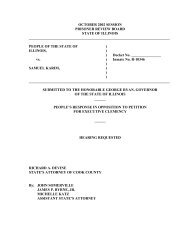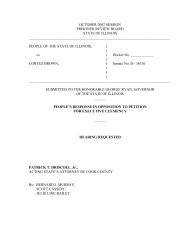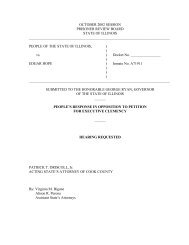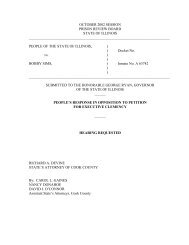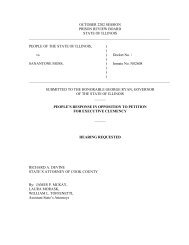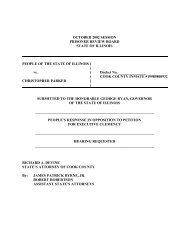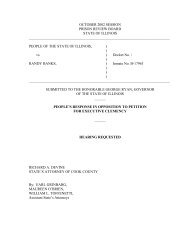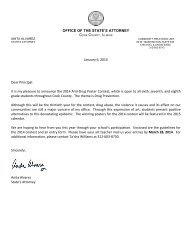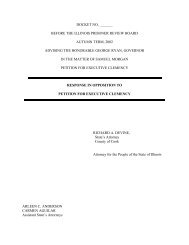Robert St. Pierre - Cook County State's Attorney
Robert St. Pierre - Cook County State's Attorney
Robert St. Pierre - Cook County State's Attorney
Create successful ePaper yourself
Turn your PDF publications into a flip-book with our unique Google optimized e-Paper software.
OCTOBER 2002 SESSIONPRISONER REVIEW BOARDSTATE OF ILLINOIS____________________________________________________________________________PEOPLE OF THE STATE OF ILLINOIS, )) Docket No.vs. ))ROBERT ST. PIERRE, ) Inmate No. N-10989))____________________________________________________________________________SUBMITTED TO THE HONORABLE GEORGE RYAN, GOVERNOROF THE STATE OF ILLINOIS______PEOPLE’S RESPONSE IN OPPOSITION TO PETITIONFOR EXECUTIVE CLEMENCY______HEARING REQUESTED(If Petition Is Considered)RICHARD A. DEVINESTATE’S ATTORNEY OF COOK COUNTYBy:JAMES E. FITZGERALDAssistant <strong>St</strong>ate’s <strong>Attorney</strong>
OCTOBER 2002 SESSIONPRISONER REVIEW BOARDSTATE OF ILLINOIS____________________________________________________________________________PEOPLE OF THE STATE OF ILLINOIS, )) Docket No.vs. ))ROBERT ST. PIERRE , ) Inmate No. N-10989))____________________________________________________________________________IHISTORY OF THE CASEFollowing a jury trial in the Circuit Court of <strong>Cook</strong> <strong>County</strong> defendant and hiscodefendants were convicted of the murders of Sybil and Benjamin Gibons. The defendant wasalso convicted of the following crimes: two counts of conspiracy to commit murder, two counts ofarmed robbery, and two counts of concealment of a homicidal death. The same jury founddefendant was eligible for the death penalty and ultimately imposed that sentence. On directappeal, our Supreme Court found that defendant’s statement, which had been used against him attrial, had been taken in violation of his Miranda rights. The defendant’s convictions and sentenceswere vacated accordingly and the case was remanded for a new trial. People v. <strong>St</strong>. <strong>Pierre</strong>, 122 Ill.2d 95 (1988). On remand, defendant pled guilty to all the charges against him. Defendantwaived a jury for sentencing purposes and the circuit court judge ultimately sentenced him todeath. Defendant’s convictions and sentences , except the conspiracy convictions, were affirmedon direct appeal. People v. <strong>St</strong>. <strong>Pierre</strong>, 146 Ill. 2d 494 (1992). Defendant then filed a petition forpost-conviction relief in the Circuit Court of <strong>Cook</strong> <strong>County</strong>. While that petition was pending the1
defendant began to engage in a series of communications with, and filed numerous motions in, theIllinois Supreme Court, wherein he continuously asked to waive all further appeals. Defendantthen would withdraw his requests. Finally, the Court ordered the circuit court to hold a hearing todetermine whether defendant was competent to waive further proceedings in Illinois. Following afull hearing wherein many experts and defendant testified, the judge found defendant wascompetent to waive proceedings. The defendant then once more moved in the Supreme Court thathe be allowed to waive further proceedings. After the Court carefully considered the record,defendant’s request was granted and his post-conviction petition was dismissed.Defendant then filed a petition for habeas corpus relief in federal court. The districtcourt found that defendant had procedurally defaulted on all of his claims save one and found thatthat one issue did not entitle defendant to relief. The petition was therefore denied. The SeventhCircuit found that defendant had not defaulted on his claims, but held that the district court had noterred in dismissing the one claim on substantive grounds. On remand, the district court held thatdefendant had not been denied his constitutional right to the effective assistance of counsel at hisguilty plea, but that he had been denied that right at the sentencing hearing. Defendant appealedthe ruling, but the <strong>St</strong>ate did not cross-appeal. Therefore, defendant has no death sentence. TheSeventh Circuit affirmed the District Court’s ruling. <strong>St</strong>. <strong>Pierre</strong> v. Walls, 2002 U.S. Appeal Lexis14734 (7 th Cir. July 23, 2002).2
IIFACTS OF THE CASEOn July 2, 1982, less than a month before the murders of Sybil and Benjamin Gibons,defendant was released from Menard Correctional Center. Upon his release defendant becamefriends with Barry Wilson, who was dating the Gibons’ adoptive daughter Jackie. Wilson wasused to Jackie supplying him with money and lending him her credit cards. Mr. and Mrs. Gibons,however, cut off Jackie’s money and credit cards. This angered Wilson and Jackie. Wilson andJackie agreed that they should kill her parents. Wilson decided to commit the crime, but wasthwarted when he fell through a window of the Gibons’ home. He fled the scene. Jackie told herparents that Wilson had broken the window and they called the police. When defendant was toldof the pairs’ plight, the three of them planned the murder of Jackie’s parents. It was decided thatdefendant would commit the murders and in return he was promised money from their insurancepolicies which Jackie would receive. Further plans were laid over the course of the next fewweeks, including buying supplies to cover the bodies, where the bodies were to be disposed of (thebodies were found in the desert southwest) and how Mr. and Mrs. Gibons were to be killed.Defendant’s weapon of choice for the murders was a hammer, which belonged to Mr.Gibons. On the appointed night, defendant arrived at the Gibons’ residence where he was let in byJackie. Mr. Gibons was home, but his wife was still at work. Jackie took defendant to the kitchenwhere she introduced him to her father. After Jackie left the kitchen, defendant took out thehammer and smashed it repeatedly into Mr. Gibons’ head, thereby causing his death. Jackie anddefendant were cleaning up the mess when her mother phoned and asked Jackie to pick her up atthe Skokie Swift. Jackie left and picked up her mom. When they arrived home, Jackie allowed her3
mother to enter the front door first. As Mrs. Gibons walked into her home defendant was waitingfor her. He struck her once in the head with the same hammer which he had used minutes before tokill her husband. After this first blow, Mrs. Gibons was able to ask her daughter “why are youdoing this to me.” Defendant then rained down more blows on Mrs. Gibons, killing her.Wilson was then called and the three then attempted to clean up the house. They evenwent to purchase plastic sheets in which they wrapped the battered corpses of Mr. and Mrs.Gibons. Defendant and Wilson then smashed a hole in the common wall between the Gibons’bedroom and garage, so that the bodies could be placed in their car in secrecy. Defendant’s belt,which was issued by the Illinois Department of Corrections and bore his prison identificationnumber, was found by the police under the Gibons’ bed. Afterwards, defendant bragged about thecrime and the money he was to receive from it to his friends.The defendant was charged by indictment with six counts of murder, two counts ofconspiracy to commit murder, two counts of armed robbery, two counts of theft, six counts of armedviolence, two counts of obstructing justice, and two counts of concealment of a homicidal death. (R.498-516) Two others, Jacqueline Gibons (the adopted daughter of the victims) and Barry Wilson,were indicted along with defendant but their cases were severed from his. All of the above chargesstemmed from the July 29, 1982 murders of Sybil and Benjamin Gibons, the adoptive parents ofJacqueline.Following a jury trial in the Circuit Court of <strong>Cook</strong> <strong>County</strong>, the defendant, Wilson andGibons were found guilty of the murders of Sybil and Benjamin Gibons, two counts of conspiracy tocommit murder, two counts of armed robbery, and two counts of concealing a homicidal death. Thatjury subsequently sentenced defendant to death.4
On appeal to the Supreme Court, defendant's convictions and sentences were reversed andthe matter was remanded for a new trial. The reversal was based on the Court's finding thatdefendant's inculpatory statement had been taken in violation of Miranda v. Arizona, 384 U.S. 436(1966); People v. <strong>St</strong>. <strong>Pierre</strong>, 122 Ill. 2d 95, 110-13 (1988). The Court also found that the admissionof defendant's statements into evidence was not harmless error. Id. at 113-15. On remand the casewas assigned to the calendar of Judge Neville. (R. 4) <strong>Robert</strong> Barasa was appointed as defendant'scounsel. (R. 7)On August 8, 1988, the court informed both sides that he had received a report from Dr.<strong>St</strong>ipes which indicated that defendant was fit. The court then inquired of counsel if defendant wasstill thinking about changing his plea to guilty. Mr. Barasa responded that it was still defendant'sdesire to change his plea. He also indicated that he had not read Dr. <strong>St</strong>ipes' entire report andanticipated having the doctor testify that afternoon. (R. 9) The People responded that they were readyto go forward with a plea. (R. 10) Both sides indicated that there had been no plea negotiations, anddefendant answered "yes" when the court asked, "So it's what we would call a blind plea, I guess?"(R. 10)The court then stated:This ought to be a somewhat extended session becausethere's a lot of things I have to go through with Mr. <strong>St</strong>.<strong>Pierre</strong> to make sure you have all the facts that you need. I'mvery sure Mr. Barasa has given it to you anyway, but it's myjob to make sure the record is clear that you have all thepotential [facts] with you.One other thing that kind of bothers me is when youindicated last time you were here that is what you wanted to5
do, it in some respects dealt with your unhappiness at beingat the jail while this thing is pending, and even if you pleadtoday, because of the nature of the charge you are chargedwith and the potential that the <strong>St</strong>ate may, even though youplead guilty, ask for the death penalty, [there] still has to bea hearing on whether that is an appropriate disposition interms of sentence, and under the statute, whether it's with aplea or a guilty finding or whatever, there's an issue to bedecided about how the hearing would go ahead and whetheryou're going to want a jury for that or not a jury.I'm not asking you to make any statement now, I'mjust throwing this out so everybody is certain [of] what weare doing, and the <strong>St</strong>ate, of course, has to make somedecisions about who they would call at that hearing andwhat kind of hearing we'd have.I don't even know if anybody talked about that, so Iwould like some information about that for my own benefitcontemporaneously with whatever we do at 1:30. (R. 11-12)Defense counsel immediately told the trial court that he had appraised the jail personnel and theprosecutor that defendant was having difficulty adjusting to the conditions at <strong>County</strong> Jail and that itwas defendant's desire to be transferred and housed at the Illinois Department of Corrections' facilityat Joliet. (R. 12)The trial court then informed defendant that he could not go to the Illinois Department ofCorrections because at that time and date defendant was not a convicted felon. It was then explainedto defendant that because his case had been reversed that he is once again presumed innocent, that hehas the right to a trial, that the <strong>St</strong>ate must prove him guilty beyond a reasonable doubt and "so you,6
are, as are a number of people in the jail, awaiting trial, and that's why you can't go to the Departmentof Corrections. There's no facility or no way to get you into that system." (R. 13) When defendantsaid he was endeavoring to get into the <strong>St</strong>ate system, the court stated:I know you're endeavoring. You understand, becauseof the seriousness of this, and we know even though,whether you like it or not, it is certain someone is going tolook at this transcript after whatever we do here and say,"Was Mr. <strong>St</strong>. <strong>Pierre</strong> hitting on all eight when this happenedand did he understand everything," because regardless ofwhat we do here now, someone is going to look at this, andpeople don't generally plead guilty if this is the potentialsentence.I don't mean it's never been done, but certainly [it] is arare occasion, do you understand that?[MR. ST. PIERRE]: Yes. (R. 15)The case was then put over until that afternoon.When court reconvened, the <strong>St</strong>ate called Dr. Albert <strong>St</strong>ipes, who is employed by the <strong>Cook</strong><strong>County</strong> Psychiatric Institute. (R. 17) Dr. <strong>St</strong>ipes examined defendant on August 4, 1988, regarding hisfitness to stand trial, plead and be sentenced. (R. 18-19) As part of his examination, Dr. <strong>St</strong>ipesreviewed defendant's previous records from the Psychiatric Institute, as well as the currentpsychological summary done at the Institute, and interviewed the defendant. (R. 19-20) Based on theforegoing it was Dr. <strong>St</strong>ipes' opinion that defendant was fit to stand trial, to plead and to be sentenced.(R. 20) Dr. <strong>St</strong>ipes also found that defendant's knowledge of the charges against him, of theproceedings and of the duties of the court personnel were quite sophisticated. He said that defendant7
had a thorough understanding of his case and used legal terms correctly. The doctor also found thatdefendant had a knowledge and understanding of the consequences of a plea of guilty. (R. 21)It was also Dr. <strong>St</strong>ipes' opinion that defendant had the ability to recollect events and wasable to communicate with his attorney. Defendant was oriented as to time, place and people. Thedoctor found nothing abnormal or unusual about defendant's social behavior and abilities, nor did thedoctor find anything unusual about defendant's ability to perform motor processes. (R. 22)Dr. <strong>St</strong>ipes stated that defendant had told him he was having difficulty dealing with hisincarceration at the <strong>County</strong> Jail. Dr. <strong>St</strong>ipes said he believed the defendant in this regard anddetermined that he was indeed having such problems. The doctor said that such problems affectedthe defendant to the extent that he wanted to get out of the jail because of the difficult time he washaving adjusting, and that this would affect the defendant's functioning or his ability to get by on aday-to-day basis. (R. 23) Specifically, defendant complained to Dr. <strong>St</strong>ipes about the noise at the jail,being bothered by other inmates and the gangs at <strong>County</strong> Jail. In essence he found the environment at<strong>County</strong> Jail to be very different from the one which existed on death row. Dr. <strong>St</strong>ipes said that he tookdefendant's statements about being upset with his living conditions into consideration in arriving athis conclusion that defendant was fit. (R. 26)The court then made the following finding:I think at this point it should be made clear in therecord that there was no general indication of any specificabnormality on the part of Mr. <strong>St</strong>. <strong>Pierre</strong> that required me toask for an examination. It was merely the unusualcircumstances that someone who has gone through anappeal process whose case is overturned and then gets the8
case sent back here for trial and has the opportunity to berepresented by able counsel and has a right to defendhimself, then decides in spite of it all to plead guilty to thesame charges for which he has now been granted a newtrial, and with that in mind, I with the concurrence of thelawyers asked for a doctor to have a conversation andexamination of Mr. <strong>St</strong>. <strong>Pierre</strong> to decide whether he knewwhat was going on here, and its obvious from what Dr.<strong>St</strong>ipes said that he does, and not only does he understand it,but because of his participation in the process here, anumber of different occasions, of different settings, he'spretty sophisticated about what goes on, so I'm confidentthat at this point Mr. <strong>St</strong>. <strong>Pierre</strong> understands the nature of thecharges, that he is able to cooperate with his counsel.I think the record should be clear that he obviouslyhas been through one trial regarding these cases, the exactsame case with which he stands charged now, the samecharges and the same evidence basically, and that hecooperated at some length with a lawyer during that trial.He also had communication with a lawyer in theappeal process and now has had another lawyer who ispresent with him here, so that I'm confident that he cancooperate with his lawyer, and if he has a decision to makein this case, he's able to do it.The only thing that bothers me and the only thing thatshould be clear in the record is that if the decision to pleadguilty is not based on one of guilt but is based on one ofinconvenience, then I don't know if I can accept it and therewill be, and I intend, during the next phase of this hearingwhich we are going into right now, to ask a number of9
questions along that line, so Mr. <strong>St</strong>. <strong>Pierre</strong>, again I'll beasking some questions directly of you.You have Mr. Barasa with you. If you want him toanswer for you, he can. If you want to answer directly, youcan. If you want to confer with him before you answer, youshould do that, okay?[MR. ST. PIERRE]: All right. (R. 30-32)There were further discussions between the court, defendant and defense counselconcerning the entering of a plea of guilty and the defendant's problems with the conditions at <strong>Cook</strong><strong>County</strong> Jail. (R. 36-40) Afterwards the trial court stated:Let me make it clear where I'm at with this. Thereare, unfortunately, hundreds of people in the <strong>Cook</strong> <strong>County</strong>Jail, and society has not yet reached a point where we havethe facilities to treat each individual with such individualitythat there can be separate decisions made about how theyare treated pending trial, and the best we are able to offer forsociety's benefit and the rights of the individuals that arerequired is that in those cases where there is no bond priorto trial or a bond that the defendant cannot make, that therehas to be someplace for those people to remain prior to trial.What we have in <strong>Cook</strong> <strong>County</strong> is <strong>Cook</strong> <strong>County</strong> Jail. Idon't think that any court or any appellate court would makea decision that an individual's indication that he isuncomfortable in the jail is a factor that a trial judge can useto determine whether he is to be housed, because we arerequired to send someone either to the penitentiary after a10
conviction, and in the interim to remand them to the <strong>Cook</strong><strong>County</strong> Sheriff, who has control over that incarceration, ...,but I cannot in good conscience accept a plea of guilty fromsomeone who would tell me he's uncomfortable with theconditions, and let me finish, who would not admit that infact he's guilty of the crimes charged.If it turns out that the defendant in this case, Mr. <strong>St</strong>.<strong>Pierre</strong>, is guilty of the crimes charged and for reasons ofpersonal, I don't know if uncomfort is the right word, but forlack of a better one, for personal comfort wants to pleadguilty so that he doesn't have to remain at <strong>Cook</strong> <strong>County</strong> Jail,I don't find any problem with that.Everyone has the right to have their case tried or nothave it tried. They have a right to plead guilty, but if thereason for the plea of guilty is not guilt of the crime, then Iwon't accept the plea.If the reason for the plea of guilty is the guilt of thecrime and I want to do it now rather than spend any moretime in the <strong>Cook</strong> <strong>County</strong> [Jail], so be it.So that's my position as the trial judge, and further, asI stated before, Mr. <strong>St</strong>. <strong>Pierre</strong> knows full well what theappeal process is. He just went through it and he won hiscase on appeal.I don't want this matter set up here in this courtroomto be one where later on there's an appeal on the basis, "Ionly pled guilty because I was uncomfortable."That's not acceptable to me and I won't take that kindof plea, so with that in mind, I understand exactly what Mr.<strong>St</strong>. <strong>Pierre</strong> said and you, Mr. Barasa, you're right, this is notthe first time we have discussed it. This is about the fifth or11
sixth time we have talked about it, so with all that in mind,I'm still ready to proceed with that understanding. (R. 40-42)It was then put on the record that defense counsel had informed defendant that this trial judge hadpreviously imposed the death penalty and that defendant still wished to change his plea and enter aplea of guilty. (R. 43-44) The court then went through each of the counts against defendant anddefendant repeatedly told the court that he understood each of these charges. (R. 45-51)The <strong>St</strong>ate then read into evidence the stipulated testimony which formed the factual basisfor acceptance of the plea. (R. 52-93) Defense counsel stated that defendant was going against hisadvice by pleading guilty and that defendant had indicated to him that he was willing to waive anymotions concerning the stipulated evidence. Defendant agreed with this statement. (R. 93-94) Whenasked by the court, defendant stated that he understood what stipulated testimony was. Defendantalso said that it would be a fair statement to say that he had heard much of the stipulated testimony athis first trial. The court then found that there was a factual basis for the plea. (R. 95)Upon questioning by the court defendant said that he understood that the <strong>St</strong>ate would notbe able to use his written statement as evidence against him. (R. 96) Defendant stated that heunderstood that by pleading guilty he was waiving the filing of any pre-trial motions. (R. 96-97) Thecourt then admonished defendant as to the possible range of sentences he could receive for each ofthe crimes charged and, as to each crime and its range of sentences, defendant stated that heunderstood. (R. 99-100)Defendant then told the court that he understood that he had a right to a trial and that he didnot have to plead guilty. Defendant was then told that he has a right to a jury trial, which was12
explained to him, and he stated that he understood what a jury trial was. (R. 101) The court thenexplained a bench trial to defendant and he stated he understood. (R. 101-102) The court thenadmonished defendant that by pleading guilty, he is admitting to the court that he did, in fact, committhe acts charged and that by doing so he also was waiving his right to either a bench or jury trial.Defendant stated that he understood this. (R. 102) The court then admonished defendant that bypleading guilty, he would be giving up his right to confront witnesses and to cross-examine them.Defendant stated that he understood this. (R. 102-103) The following colloquy then occurred:THE COURT: The last thing I have to check with you Mr.<strong>St</strong>. <strong>Pierre</strong>, is whether or not this plea is voluntary, and as Iindicated to you before when we had the colloquy about theconditions in the jail, I cannot accept your plea unless it isvoluntary.If you are only pleading guilty because you're beingforced to do it in some way, then of course it is notappropriate for me to accept your plea of guilty. Do youunderstand that?[MR. ST. PIERRE]: Yes, I do, your Honor.THE COURT: So my question to you, Mr. <strong>St</strong>. <strong>Pierre</strong>, is areyou pleading freely and voluntarily, without force or threatof someone coercing you into pleading guilty?[MR. ST. PIERRE]: I'm pleading voluntarily. (R. 103)In response to the court's explanation of the purpose for a factual basis, the defendant stated, "YourHonor, if I might, okay, to enter a plea of not guilty, okay, when in fact I did commit the crime wouldbe tantamount to trying to get away with murder, and that's not my intention." (R. 105) The13
defendant was again admonished as to his rights he would be waiving and entered guilty pleas to eachof the charges against him. The pleas were then accepted by the court and judgment was entered onthe findings. (R. 111-117)The court then instructed the defendant to confer with his attorney concerning the questionof whether defendant wanted a jury at his sentencing hearing. The court also told defendant that heshould talk to his attorney about a new PSI. Defendant had a right to have a new pre-sentenceinvestigation report made, or he could waive a new PSI and the judge would consider the one made atthe previous trial. (R. 117-118) After a short recess, defendant told the court that he had conferredwith his attorney and that it was defendant's wish to have the judge decide the appropriate sentence.(R. 118-119) The court then told defendant that the possible sentences for the double homicide wereeither life imprisonment without parole or death. Defendant stated that he understood these possiblesentences. (R. 119) The procedure utilized at the sentencing hearing was then explained to thedefendant. The jury waiver was then read to defendant and he stated he understood that by signing ithe was giving up his right to have a jury decide eligibility and the question of the imposition of thedeath sentence. The jury waiver was executed by defendant and accepted by the court. (R. 122)Thereafter, the court asked defendant if he had discussed with his attorney the desirability of having anew PSI report made for the hearing in aggravation and mitigation. Defendant stated that he waivedthe PSI for the hearing and executed a waiver to that effect. (R. 122-123)On the following day the court asked defendant if he had changed his mind about waivinga jury for the sentencing hearing. Defendant said he had not changed his mind. (R. 125) Defensecounsel filed a motion to withdraw the plea of guilty and order appropriate pre-trial incarceration.Defendant informed the court that he did not want that motion filed. (R. 125-126)14
The court then questioned defendant regarding his attorney's motion. Defendant agreedwith the court that he had plead guilty to the charges because he was guilty. (R. 131) Defendantstated that his plea was voluntary. Defendant agreed that he did not get along with the individuals atthe <strong>County</strong> Jail and that is why he was unhappy about being housed there. (R. 132) The followingcolloquy then took place:THE COURT: In any event, I advised you yesterday, andI'm going to do it again, if you are pleading guilty to thischarge merely to get out of the jail and you did not in factcommit the acts with which you are charged and whichyesterday you plead guilty [to], and that you are in someway indicating that you are at such a high state ofdiscomfort that you can't stand to get ready for trial andprepare your case and assist your lawyer, and you just haveto get out of jail, regardless of whether you are guilty or notguilty of the charges, I cannot and will not accept your pleaof guilty.Do you understand that?[DEFENDANT]: Yes, your Honor.THE COURT: If you are saying to me that you are guiltyof these charges, as you did yesterday, that you committedthe acts with which you are charged in the indictment, asyou did yesterday, and the statement of facts which wasready [sic] by the <strong>St</strong>ate's <strong>Attorney</strong> is basically the statementof facts as you understand that to be, then if your motivationis to plead now rather than later, or not take a trial, forwhatever reason, I can take the plea. But as long as it isdone voluntarily, and as long as I am convinced that your15
motivation in doing this is one that you are in fact guilty ofthe crime and, two, you feel it is in your best interests to doit now rather than at some later time.Is that clear, Mr. <strong>St</strong>. <strong>Pierre</strong>?[DEFENDANT]: Yes, it is, your Honor.THE COURT: Okay. What is your answer to thatquestions [sic]?[DEFENDANT]: I'm not pleading guilty merely to leavethe facility.That, however, is one of the reasons. But the mainreason is that I'm in fact guilty of the crime.THE COURT: Which you are charged with?[DEFENDANT]: To which I plead guilty.THE COURT: Okay. All right. On that basis then, andknowing that Mr. <strong>St</strong>. <strong>Pierre</strong> did not ask to have this motionfiled, then the motion is denied. (R. 133-134)The sentencing hearing then commenced.It was stipulated that defendant was 19 years old at the time of the offenses. (R. 140-141)Defendant, himself, acknowledged that he was 19 at the time of the murders. (R. 146, 153) ThePeople asked the court to take judicial notice of the plea proceedings and the judgment of guiltentered thereon. (R. 141) The People's position was that defendant was eligible for the death penaltyon three theories: 1) that he had been found guilty of murdering two or more individuals; 2) that themurders were committed during the course of a forcible felony; and/or 3) that the murders werecommitted pursuant to a contract or understanding for money. (R. 141-142) The court found beyonda reasonable doubt that defendant was eligible for the death penalty because he had attained the age16
of 19 years at the time the murders had been committed and because defendant had been convicted ofmurdering two or more individuals and those murders were committed during the course of anotherfelony. (R. 149-150)At the second phase of the sentencing hearing it was stipulated that if Investigator LeonardPeterson of the <strong>Cook</strong> <strong>County</strong> Sheriff's Department was called to testify, he would detail the attemptescape from <strong>Cook</strong> <strong>County</strong> Jail on January 4, 1983, by several inmates, including defendant.Defendant's statement about this affair was published and later admitted into evidence. (R. 154-159,161, 175) The People also put into evidence defendant's three prior convictions for theft. (R. 177)Defense counsel stated to the court that it was defendant's wish not to proceed with thecalling of witnesses in mitigation. Rather, it was the defendant's wish for his attorney to make astatement with the caveat that defendant would be able to expound on any point if he thought it to benecessary. (R. 163) Counsel stated that he had told defendant about the benefits of going forwardwith a full mitigation hearing. (R. 170-171) The court told defendant that he should sleep on hisdecision and reminded defendant that the court would not rush the proceedings because the decisionto be made was too important. (R. 164-165, 166-167) The court continued to try to impress upon thedefendant the importance of his decision. Finally, defendant acquiesced and the hearing wascontinued until the next day. (R. 168)The following day, August 10, 1988, the People presented their closing argument. At itsconclusion defense counsel informed the court that defendant wished to put on a full hearing inmitigation. (R. 195) The court agreed and the hearing was put over for 30 days when mitigationevidence was presented. (R. 201) After considering the evidence in aggravation and mitigation thejudge sentenced defendant to death.17
The trial court thereafter reconsidered its earlier rulings and ordered that defendant betested to determine his sanity at the time of the offense. (R. 435-436) Dr. Albert <strong>St</strong>ipes examineddefendant on February 23, 1989. The examination consisted of Dr. <strong>St</strong>ipes' review of ISPI records,transcripts of Monte Williams' testimony, police reports and a personal interview with defendant. (R.443) Dr. <strong>St</strong>ipes obtained recent information from defendant, discussed the incident with him andtalked with defendant about his life around the time of the murders. The interview lastedapproximately two hours and defendant was responsive and oriented. (R. 444) Dr. <strong>St</strong>ipes concludedthat defendant, at the time of the murders, was able to appreciate the criminality of his conduct andable to conform his conduct to the requirements of the law. (R. 445) The court found that defendantwas legally sane at the time of the murders.18
IIIREASONS FOR DENYING THE PETITIONThe foremost reason why defendant should not be granted clemency is that there is nosentence of death, or any other sentence, that has been imposed for his murders of Sybil andBenjamin Gibons. As the Seventh Circuit Court of Appeals noted, “Although the state could againseek the death penalty in the new sentencing hearing, this is no longer a death penalty case becausethere is currently no such penalty awaiting the defendant.” <strong>St</strong>. <strong>Pierre</strong> v. Walls, No. 01-3480 (July23, 2002, 7 th Cir.). Since there is no sentence to commute or otherwise seek clemency from (anddefendant’s attorneys only seek commutation of his possible sentence and not a pardon for themurders he has freely admitted to committing) his petition for clemency is premature.The Petition for Executive Clemency filed by defendant’s attorneys on behalf ofdefendant is an improperly filed petition, and should be returned by both the Governor and thePrisoner Review Board as improperly filed. 730 ILCS 5/3- 3-13( a) permits petitions to be filedonly if signed by the defendant seeking clemency or "a person on his behalf." There is no statementwhatsoever that defendant has acknowledged that this petition could or should be filed on hisbehalf. In fact, the petition states that defendant has refused to sign it and that he does not seekclemency. There is no such affidavit and in fact the petition itself specifically states that defendanthas not filed his own verified petition in accordance with the Prisoner Review Board's guidelines.Defendant is certainly capable of filing court documents, since he has filed and signed variouspleadings over the history of this case. It is thus abundantly clear that he has refused to sign, doesnot acknowledge that this petition is signed on his behalf and that he is certainly capable of signingas well as deciding whether or not to seek clemency.19
The clemency application statute contains a more general provision that nothing in section5/3-3-13 shall be construed to limit the power of the Governor under the Constitution to grant areprieve, commutation of sentence or pardon. But, this provision cannot be read to permitconsideration of unsigned petitions in capital cases. It is the Constitution itself that provides boththe Governor's power to grant clemency and the legislature's power to regulate the manner inwhich clemency must be applied for. Thus, subsection 13(e) specifically contemplates that theGovernor will act only "under the constitution," i.e. that his power would be cabined by anyrestrictions upon the application process constitutionally enacted by the General Assembly. Toread subsection 13(e) to permit the Board or the Governor to act on an unsigned petition wouldrender meaningless all the previous subsections of 5/3-3-13, as well as the language in Article 5,section 12 of the Constitution authorizing legislative regulation of the manner of applying forclemency.The signing requirement for capital cases was plainly enacted under the constitutionalpower of the legislature to regulate the manner of applying for clemency. It represents arequirement that is entirely concerned with that procedure, and does not attempt to limit theGovernor's power to grant clemency to any inmate or category of inmates based on any substantivedistinction, or even any procedural distinction other than one of form. More critically, it does notimplicate the real subject of subsection 13(e), which was the preservation of a governor's discretionto decide whether and to what extent to grant clemency to a person who qualifies for it and hascomplied with proper application procedures.Based on these provisions, enacted under the legislature's constitutional power toregulate the manner in which clemency is applied for, the petition, filed on behalf of defendant20
must be rejected by this Board, because the petition itself states that defendant had refused to signit and that he does not seek clemency on his own behalf.The facts of this case alone provide sufficient reason to deny clemency. The SeventhCircuit Court of Appeals, in its most recent opinion in defendant’s case, gave the following vividdescription of defendant’s actions in murdering Sybil and Benjamin Gibons,At age 19, <strong>Robert</strong> <strong>St</strong>. <strong>Pierre</strong> was involved in a brutalmurder for hire scheme in 1982, just three weeks after hewas paroled from prison. Subsequently, <strong>St</strong>. <strong>Pierre</strong>developed a friendship with a man named Barry Wilson.At the time, Barry Wilson was dating one Jackie Gibons.Wilson became angry with Jackie's parents, Benjamin andSybil Gibons, because they had taken away Jackie's creditcards and no longer supplied her with cash. This causedJackie to be unable to supply Wilson with money, and sohe devised a scheme to kill her parents.Originally, Wilson planned on doing the job himself,and had even bought a gun. However, Wilson's attempt atmurder was thwarted when he fell through a window at theGibons' home and abruptly fled. Wilson told Jackie aboutthe attempt and told her to clean up the mess he had made.Instead, Jackie told her parents about Wilson's attempt,and they contacted the police.A short time later, Jackie and Wilson met with <strong>St</strong>.<strong>Pierre</strong> in downtown Chicago to discuss hiring <strong>St</strong>. <strong>Pierre</strong> tocommit the murders. They discussed the method, timing,and payment in detail. <strong>St</strong>. <strong>Pierre</strong> agreed that he would killBenjamin and Sybil Gibons for $500 up-front for eachmurder and $2,000 later (although as much as $10,000 wasdiscussed). The plan called for <strong>St</strong>. <strong>Pierre</strong> to kill the Gibonsat around 6 p.m. that evening.<strong>St</strong>. <strong>Pierre</strong> later met with Jackie Gibons in an alleybehind her workplace to verify that she still wanted themurders to take place. Reassured of Jackie's intent, <strong>St</strong>.<strong>Pierre</strong> went to the Gibons' home in Skokie, Illinois, at 6:30p.m. Jackie introduced <strong>St</strong>. <strong>Pierre</strong> to her father (SybilGibons was not at home), and <strong>St</strong>. <strong>Pierre</strong> spoke withBenjamin Gibons for a while. Benjamin Gibons thenproceeded into the kitchen and <strong>St</strong>. <strong>Pierre</strong> picked up ahammer, followed Benjamin into the kitchen and21
ludgeoned him to death. After Benjamin was dead, <strong>St</strong>.<strong>Pierre</strong> robbed him, taking all the money in his wallet. Asplanned, Jackie then called Wilson, who came over, andthe three cleaned up the bloody kitchen, wrappedBenjamin Gibons's body in a plastic bag, and placed it inthe master bedroom.At 7 p.m., Detective McLaughlin called the homelooking for Benjamin Gibons to follow up on investigationof the murder attempt by Wilson. Jackie told the detectivethat her father was out and that she would have him returnthe call when he came home. At approximately 7:10 p.m.,Sybil Gibons called and asked Jackie to pick her up at theSkokie Swift train station. First, Jackie drove Wilson to ahardware store to buy some plastic bags, sheets, and . tape,and to a liquor store. Jackie drove Wilson back to herhome, and then went to the station to pick up her mother.Upon arriving back at the home, Jackie let her motherenter the home first. As planned, <strong>St</strong>. <strong>Pierre</strong> was waiting inthe hallway and he bludgeoned Sybil Gibons to death,hitting her on the head with a hammer as she walkedthrough the front door of her own home. The killerscleaned up the blood and wrapped Sybil Gibons' body inplastic. <strong>St</strong>. <strong>Pierre</strong> and Wilson punched a hole in the wallleading to the driveway, so they could load the bodies intothe trunk without being seen. <strong>St</strong>. <strong>Pierre</strong> was to accompanyWilson to dispose of the bodies in Arkansas (or California,accounts differ) and receive the rest of his money. <strong>St</strong>.<strong>Pierre</strong> then went home and waited to take the trip andcollect his payment. Instead of picking up <strong>St</strong>. <strong>Pierre</strong>,Wilson drove the bodies to New Mexico where he buriedthem in a shallow grave.A few days later Sybil Gibons' sister contacted thepolice because Sybil had not been to work for severaldays. A detective was dispatched to the Gibons' home andthere he discovered evidence of the carnage that was notcompletely cleaned up by the killers. The detective alsofound a belt belonging to <strong>St</strong>. <strong>Pierre</strong>, bearing his name andprison identification number. The next day the policequestioned Jackie Gibons and she gave the police astatement about the murders. The police then apprehended<strong>St</strong>. <strong>Pierre</strong>; Wilson was later arrested in Arizona.<strong>St</strong>. <strong>Pierre</strong> v. Walls, slip op. at 2-4. The brutal and heinous nature of this crime are apparent from22
these facts. Indeed, the facts of this case are alone sufficient reason to deny the petition forclemency.The defendant continues to complain in his petition that his counsel was ineffectivewhen defendant voluntarily entered his guilty pleas to the murders of Sybil and Benjamin Gibons.This claim has been rejected by every court which has reviewed the issue. It must be rememberedthat defendant pled guilty against the advice of counsel. Also, it was defendant who frustratedcounsel at every turn by refusing to heed his advice. Defendant fought him over every motion hefiled on defendant’s behalf. In emphatically rejecting defendant’s claim the Seventh Circuit held,Counsel for <strong>St</strong>. <strong>Pierre</strong> wanted to put on a defense attrial, even sought to withdraw the guilty plea. It was <strong>St</strong>.<strong>Pierre</strong> who made the decision to plead guilty to thecharges. Several psychologists, the judge, and counsel allagreed that he was competent to do so. Based on all theavailable evidence at the time of the plea and the<strong>St</strong>rickland standard, it is impossible to say that counsel'sperformance was deficient. In fact, counsel's overallperformance at the pleading stage, considering his client'sattitude and intent, was commendable. See Balfour v.Haws, 892 F.2d 556 562-63 (7th Cir. 1989) (noting thatfor specific allegations of effective assistance courts must"weigh the overall quality of representation provided tothe defendant" and not individual shortcomings). Thedistrict court's conclusion, finding counsel's performancedid not fall below objective standards of reasonableness,was correct.<strong>St</strong>. <strong>Pierre</strong> v. Walls, slip op. at 30. Defendant’s complaints to this Board are just that, complaints.Defendant simply wants this Board to review the evidence once again. He is not entitled to furtherreview because his trial attorney did all that he could do for defendant despite defendant’s bestefforts to frustrate his every attempt to assist him in defending against the charges.Defendant also complains that his guilty plea hearing was not fair and that he did not23
knowingly and voluntarily enter his pleas of guilty. Nothing could be further from the truth. JudgeNeville held a lengthy hearing before allowing defendant to enter his guilty pleas. The judgeordered several exams to determine defendant’s competency to plead, to stand trial and to besentenced. He even allowed the defendant to be examined to determine his sanity at the time of theoffenses. Judge Neville repeatedly, over a two day period, questioned defendant about why hewanted to plead guilty. The judge would not accept the plea until he was fully satisfied thatdefendant was competent to enter the pleas and that he was pleading guilty because he was in factguilty of the crimes charged. In rejecting this claim, the Seventh Circuit held,24
The facts most indicative of a knowing andvoluntary plea are directly drawn from <strong>St</strong>. <strong>Pierre</strong>'s ownparticipation in the proceedings. Both Judge Neville andcounsel stated that <strong>St</strong>. <strong>Pierre</strong> knew what he was doing andhad meaningfully participated in the proceedings and hisdefense. <strong>St</strong>. <strong>Pierre</strong> staunchly contested a minor issue offact, related to the robbery count and Sybil Gibons' ring,until it was resolved to his satisfaction. Following acomprehensive hearing, Judge Neville concluded that <strong>St</strong>.<strong>Pierre</strong> knew his rights and made the voluntary decision toplead guilty. And when counsel filed a motion to withdrawthe plea, <strong>St</strong>. <strong>Pierre</strong> interrupted to make it clear that themotion was being made by counsel and against his wishes.<strong>St</strong>. <strong>Pierre</strong> was advised not to plead guilty, and aboutthe possibility of using insanity as a defense. He flatlyrejected the option of going to trial, and according toJudge Neville he did so knowingly and voluntarily. <strong>St</strong>.<strong>Pierre</strong> was found competent, and as the judge noted,appeared to meaningfully participate in his defense.Additionally, counsel noted that <strong>St</strong>. <strong>Pierre</strong> understood thecharges and clearly wanted to plead guilty. Today <strong>St</strong>.<strong>Pierre</strong> says he wouldn't have pled guilty. However,hindsight is expressly prohibited in our analysis. See Hill,474 U.S. at 56-59; <strong>St</strong>rickland, 466 U.S. at 688-91. All thefacts show that he understood the decision he was makingand voluntarily made it because he wanted to acceptresponsibility for his crimes. There is no evidenceindicating that the plea was not knowing and voluntary.<strong>St</strong>. <strong>Pierre</strong> v. Walls, slip op. at 33. Thus, as defendant’s pleas were knowingly and voluntarily givenhe is not entitled to clemency on this ground.As noted previously, defendant has a criminal record and committed these crimes whenhe was 19 years old. His adjustment to prison life has been miserable. The People have attachedto this response defendant’s disciplinary record which lists his violations and covers ten (10) pages.That record contains every violation from being disorderly to possession of drugs and othercontraband to arson to possession of a dangerous weapon (stainless steel sharpened to a point).Defendant has continued his criminal ways even while confined to death row. His life-long25
addiction to crime shows contempt for our society and our system of justice. Defendant is not aperson who should be granted clemency.Defendant asserts that he is entitled to clemency because he did not receive the benefitof the changes to the Illinois capital sentencing system which have recently been adopted,proposed or enacted. By relying upon a laundry list of new Supreme Court Rules, statutes andproposals from the Governor’s Commission on Capital Punishment which were not available at thetime of his trial, defendant claims that his trial (as well as that of every other capital defendant inIllinois) was by definition fundamentally unfair. However, the Illinois Supreme Court hasexpressly rejected the claim “that every capital trial has been unreliable and that all appellatereview has been haphazard” (People v. Hickey, ___ Ill. 2d ___, 2001 Ill. LEXIS 1080 at *57 (No.87286 September 27, 2001)). Rather, the Court held that the additional safeguards included in itsrules governing capital cases are not retroactively applicable because they “function solely asdevices to further protect those rights given to defendants by the federal and state constitutions”and that “[a] violation of procedures designed to secure constitutional rights should not be equatedwith a denial of those constitutional rights.” Id. at *63, 64.Thus, the fact that the Court, the General Assembly and the Governor’s Commissionhave endeavored to improve the process does not mean that an injustice would result simplybecause the recent changes were not applied retroactively to defendant’s case. Instead, a trueinjustice would only result if it were reflexively determined that defendant’s guilty plea hearingwas fundamentally unfair without any examination of the proceedings themselves. It is telling,however, that defendant has not even attempted to demonstrate how the recent changes would haveaffected the outcome of the proceedings.26
Supreme Court RulesDefendant asserts that he is entitled to clemency because the new Supreme Court Rulesgoverning capital cases were not applicable to his proceedings. However, the Illinois SupremeCourt has clearly held that the amendments to its rules are not retroactively applicable. Hickey,2001 Ill. LEXIS 1080 at *65.Decision to Seek DeathDefendant claims his sentence should be reduced because the <strong>St</strong>ate’s <strong>Attorney</strong>’s decisionto seek death was made without uniform protocols to guide his discretion and was not approved bya state-wide review committee. However, “[i]t has long been recognized by th[e Illinois SupremeC]ourt that the <strong>St</strong>ate's <strong>Attorney</strong> is endowed with the exclusive discretion to decide which of severalcharges shall be brought, or whether to prosecute at all. A prosecutor's discretion extends todecisions about whether or not the death penalty should be sought.” People v. Jamison, 197 Ill. 2d135, 161-62, 756 N.E.2d 788 (2001). Therefore, any attempt to mandate such a review wouldconstitute an impermissible restriction on the independence of the various <strong>St</strong>ate’s <strong>Attorney</strong>s underthe Illinois Constitution. Moreover, defendant does not even allege much less argue that thedecision to seek death in his case was the result of an abuse of discretion. It must be rememberedthat defendant was found eligible for the death penalty under two factors: (1) that the deathsoccurred during the course of another felony; and (2) that defendant had been convicted ofmurdering two or more individuals. Accordingly, it must be rejected.27
AllocutionDefendant also claims that clemency is appropriate because he was denied theopportunity to make a statement in allocution at his sentencing hearing. However, as the IllinoisSupreme Court stated long ago, “an unsworn statement to the sentencing jury [to be] consider[ed]along with testimony given under oath and the arguments of counsel would at the least confuse thejurors, and might also impair their ability to weigh the aggravating and mitigating factors.” Peoplev. Gaines, 988 Ill. 2d 342, 380, 430 N.E.2d 1046 (1981). Moreover, defendant was free to testifyunder oath at his sentencing hearing to explain why he should not be sentenced to death, and he didso. Therefore, he was given every opportunity to present himself to the trier of fact before he wassentenced.Supreme Court ReviewDefendant also claims that he is entitled to clemency because the Illinois Supreme Courtfailed to consider whether his death sentence was disproportionate, excessive or otherwiseinappropriate. However, because the Illinois Supreme Court has demonstrated that it will addresscomparative sentencing arguments whenever they are raised by defendants in capital cases (seePeople v. Emerson, 189 Ill. 2d 436, 727 N.E.2d 302 (2000); People v. Palmer, 162 Ill. 2d 465, 491,643 N.E.2d 797 (1994)) and will vacate a death sentence if it determines that it is excessive in lightof the facts of the case and the defendant’s background (see People v. Smith, 177 Ill. 2d 53, 685N.E.2d 880 (1997); People v. Blackwell, 171 Ill. 2d 338, 665 N.E.2d 782 (1996)), it is clear thatthe only reason the Illinois Supreme Court did not review defendant’s sentence in such a manner isbecause he did not ask the Court to do so.28
In any event, the Supreme Court did find in this case that the trial judge had properlyconsidered the evidence in mitigation and rendered a sentence which was commensurate with thegravity of the crimes committed. People v. <strong>St</strong>. <strong>Pierre</strong>, 146 Ill. 2d 494, 513-16 (1992). Defendantalso contends that clemency should be granted because his sentence is harsher than the onesreceived by his co-defendants even though each is equally responsible for the murders. WhileJackie Gibons and Barry Wilson may have originally conceived the plan to murder Jackie’s parentsand drew defendant into that plan, the fact remains that they did not strike the blows which resultedin the deaths of Sybil and Benjamin Gibons. It was defendant, and not his co-defendants, whorepeatedly struck Mr. Gibons in the head with a hammer as the man stood in his own kitchen. Itwas the defendant, and not his co-defendants, who waited 30 minutes for Mrs. Gibons to comehome from work and then struck the blows that killed her as she entered the front door of her ownhome. While the conduct of the co-defendants is reprehensible, the conduct of the defendant, asthe man who actually killed Sybil and Benjamin Gibons, is much more reprehensible. His actionswere cold and calculating. He murdered these people in their own home. First he struck down Mr.Gibons and then waited 30 minutes for Mrs. Gibons to return home before striking her down.During these 30 minutes defendant could have disassociated himself from the criminal enterprise,but chose not to do so. Instead, defendant acted with the coldest of hearts and continued hismurderous deeds.In conclusion, it is clear that defendant should not be granted clemency for his brutal andheinous murders of Sybil and Benjamin Gibons in their own home. Much planning went into thecommission of these crimes and defendant committed these murders in expectation of financialgain. He has been a criminal his entire life and has shown no signs of changing that lifestyle since29
his incarceration. The history of this case shows that our system of justice has worked as it wasdesigned to work. When a trial error affecting the verdict occurred, defendant was afforded a newtrial. When it was found that defendant received the ineffective assistance of counsel at sentencinghe was granted a new sentencing hearing, which has not yet been held. Since defendant has nosentence of any kind and because he did not sign his petition there is no ground upon whichcommutation of sentence can be based. Defendant’s rights have been recognized and guardedevery step of the way over these many years.There is no doubt that defendant committed these murders. He freely pled guilty to thecharges in open court while represented by counsel. Granting clemency to this defendant would bean insult to the memory of the victims and to their surviving friends and family. As defendant saidat his guilty plea hearing, after stating that his pleas were voluntarily entered,“Your Honor, if I might, okay, to enter a plea of notguilty, okay, when in fact I did commit the crime would betantamount to trying to get away with murder, and that’snot my intention.”To grant clemency to defendant would be tantamount to allowing defendant to get away withmurder. Moreover, defendant has declined to sign the petition which was filed by his attorneys andhe does not seek clemency on his own behalf. His petition for clemency must be denied.30
CONCLUSIONFor all these reasons, the People of the <strong>St</strong>ate of Illinois respectfully request that thisBoard and Governor Ryan deny executive clemency to <strong>Robert</strong> <strong>St</strong>. <strong>Pierre</strong>.Respectfully submitted,RICHARD A DEVINE<strong>St</strong>ate’s attorney of <strong>Cook</strong> <strong>County</strong>By:JAMES E. FITZGERALDAssistant <strong>St</strong>ate’s <strong>Attorney</strong>31


